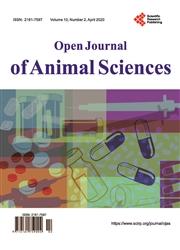Review: Effects of Dietary Fiber Levels and Composition on the Intestinal Health of Finishing Pigs
引用次数: 2
Abstract
Despite the fact that dietary fiber is predominant in common feedstuff, its level in the diets of monogastrics has seen a proportional increment with the inclusion of co-products. The source and composition of DF could be liable for enormous varieties in their use. A study carried out by scientists proposed that three major components constitute gut health: the diet, the mucosa, and the commensal microbiota. 70% of total body immune cells constitute the gastrointestinal tract of pigs, therefore it is important that it is included when defining intestinal health. Gut health is of substantial importance in the maintenance of growth performance and overall health of monogastrics. The fermentation of DF results in SCFA which enhances mucosal epithelial proliferation and villus height. Nonetheless, supplementing dietary fiber to the diet in moderation may result in an increase in gut size, volume, length and morphological structure of pigs and other non-ruminants. Gut health maintenance exhibits a certain level of complexity and a subtle balance between mucosa, diet, the commensal microflora, including the digestive epithelium and along with mucous overlaying it. The microbial changes of dietary fiber to monosaccharides in the gut include various principal occasions (reactions) intervened by the enzymatic collection of particularized groups from the gut microbiota. Because fermentation is dependent upon source, structure and physio-chemical properties of dietary fiber, it is therefore of great importance to have as much data as possible on various types of dietary fiber and how intestinal health can be enhanced by them. Thus, there is growing evidence that dietary fiber may have prebiotic effects in pigs. In addition, dietary fiber in diets improves pigs well-being by increasing satiety, influencing behaviour and improving overall health. This review aims to shed more light on the dietary fiber levels and composition on the intestinal health of finishing pigs.饲粮纤维水平和组成对育肥猪肠道健康的影响
尽管膳食纤维在普通饲料中占主导地位,但随着共同产品的加入,其在单目饲料中的含量已呈比例增加。DF的来源和组成在其使用中可能有很大的变化。科学家进行的一项研究提出,肠道健康的三个主要组成部分:饮食、黏膜和共生微生物群。猪的胃肠道占全身免疫细胞总数的70%,因此在定义肠道健康时将其包括在内是很重要的。肠道健康对维持单畜禽的生长性能和整体健康至关重要。DF发酵产生SCFA,促进粘膜上皮细胞增殖和绒毛高度。然而,在日粮中适量添加膳食纤维可能会增加猪和其他非反刍动物的肠道大小、体积、长度和形态结构。肠道健康的维持表现出一定程度的复杂性,并在粘膜、饮食、共生菌群(包括消化上皮及其覆盖的粘膜)之间保持微妙的平衡。膳食纤维在肠道中转化为单糖的微生物变化包括多种主要场合(反应),这些反应是由肠道微生物群中特定群的酶收集所干预的。由于发酵取决于膳食纤维的来源、结构和理化性质,因此尽可能多地掌握各种膳食纤维的数据以及它们如何促进肠道健康是非常重要的。因此,越来越多的证据表明,膳食纤维可能对猪有益生元效应。此外,日粮中的膳食纤维通过增加饱腹感、影响行为和改善整体健康状况来改善猪的健康状况。本文旨在进一步了解饲粮纤维水平及其组成对育肥猪肠道健康的影响。
本文章由计算机程序翻译,如有差异,请以英文原文为准。
求助全文
约1分钟内获得全文
求助全文

 求助内容:
求助内容: 应助结果提醒方式:
应助结果提醒方式:


